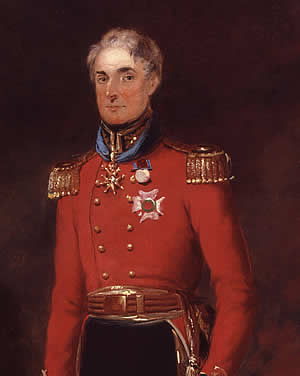 Sir Peregrine Maitland, KCB, GCB (6 July 1777 – 30 May 1854) was a British soldier and colonial administrator. He also was a first-class cricketeer from 1798 to 1808.
Sir Peregrine Maitland, KCB, GCB (6 July 1777 – 30 May 1854) was a British soldier and colonial administrator. He also was a first-class cricketeer from 1798 to 1808.
Born at Long Parish House, Hurstbourne, Hampshire, the eldest of five sons of Thomas Maitland of Lyndhurst, Hampshire, (d. 1798) by his spouse Jane, daughter of Edward Mathew, General of the Coldstream Guards by his wife Lady Jane (d. 21 August 1793), daughter of Peregrine Bertie, 2nd Duke of Ancaster and Kesteven. Thomas Maitland possessed plantations in the parish of St. Thomas Middle Island on the island of St. Christopher.
Military career
He joined the Grenadier Guards at the age of 15 as an Ensign. He went on to serve in Flanders in 1794, by which time he achieved his promotion to Lieutenant. In 1798, he took part in the unsuccessful landing at Ostend. In the Peninsular War, he served at both the Battle of Vigo, and at Corunna, at which he won a medal. He took part in the Walcheren in 1809. During the later stages of the Peninsula War was second in command of his regiment at Cadiz, and later at the Battle of Seville.
He served with distinction at Quatre Bras and the Battle of Waterloo. Promoted in early June (3 June 1815) to Major General, he was assigned to the First Corps, under overall command of the so-called "Slender Billy". On the second day of battle, at Waterloo, he commanded two battalions of the First Grenadier Guards, each 1000-men strong; there he led the Guards in repelling the final French assault of the French Old Guard on 18 June. Subsequent to action at Waterloo, he dubbed a Knight Commander of the Order of the Bath, 22 June 1815, the Order of Wilhelm (Dutch), and the Order of Vladimir.
He was appointed lieutenant governor of Upper Canada in 1818 and supported the Family Compact that dominated the province. He attempted to suppress and reform pro-American tendencies in the colony and resisted demands of radicals in the government. His tenure in Upper Canada ended in 1828 when he was appointed lieutenant-governor of Nova Scotia serving there from 1828 until 1834.
Maitland went to India and became commander in chief of the Madras army in 1836 serving for two years. In 1844 he became governor of the Cape of Good Hope, but was removed during the Xhosa War. He is still highly respected in the Kingdom of Lesotho for his judgment on the border issue between the Orange River Afrikaners and the Basotho of King Moshoeshoe, which, had it been implemented, would have secured the economic future of the kingdom. He was made a Knight Grand Cross of the Order of the Bath on 6 April 1852.
Lieutenant Governor of Nova Scotia
Maitland became the lieutenant governor of Nova Scotia on 29 Nov. 1828, with the added responsibility of commander-in-chief of the forces in the Atlantic region. He was popular. Certainly, his strongly moral conduct had an impact on Halifax’s society. By insisting on walking to church, he effectively ended the garrison parades on Sunday, the city’s major social event, and he publicly denounced the open market that day.
Maitland was responsible for the settlement reached for Pictou Academy. In dealing with immigration and settlement, he had lands laid out in Cape Breton at crown expense so that the 4,000 immigrants expected that year could be legally placed and systematically settled.
In October 1832 Maitland went to England on leave, presumably because of his health, and the government was placed in charge of Thomas Nickleson Jeffery. Though he continued to conduct official correspondence from England, he never returned to North America and he was succeeded in Nova Scotia by Sir Colin Campbell in July 1834.
First-class cricket career
Maitland was an amateur first-class cricketer who made 27 known appearances in major cricket matches from 1798 to 1808.
He was mainly associated with Marylebone Cricket Club (MCC) and he also played for Surrey and Hampshire.
(information derived from http://en.wikipedia.org/wiki/Peregrine_Maitland)